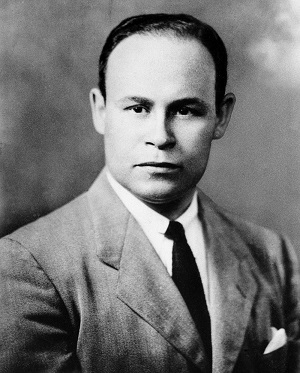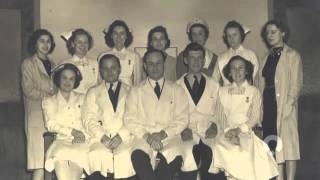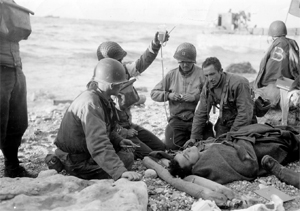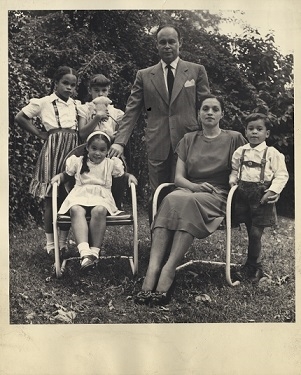 |
| Dr. Charles Richard Drew (1904-1950) (http://newsroom.cumc.columbia.edu/blog/2014/01/29/ ()) |
An African American man with a dream struggles to get through college because of his lack of funds. He works day and night to make enough money to enroll in medical school, despite the low expectations set for him by his friends and family. Few could have seen that this man would eventually become one of the most influential medical professionals of his time, and save countless lives through his research. Dr. Charles Richard Drew was born June 3, 1904 into a family in a black community, and was taught to take school seriously even though expectations for his race were low from the beginning. He graduated from high school and went to Amherst College on a sport scholarship. He took on many jobs to be able to pay for medical school afterwards. During his time at school, he learned and researched blood, and had many tremendous findings that changed the medical world. Then when World War II broke out, he was assigned to help out the Red Cross, and through his blood banks, he saved countless lives. A hero should be hard working (even when expectations are low), knowledgeable, and brave, no matter what others say. And Dr. Drew's life definitely met the criteria for a hero. He exemplified heroic traits by building himself up from his humble beginnings to become one of the world's greatest blood scientists and surgeons, and inspired future generations through his hard work, knowledge of his profession, and bravery.
 |
| Dr. Charles Drew and his students (https://www.youtube.com/watch?v=EK8F1JnxRuU ()) |
By ignoring expectations set by others, Drew's hard work and strong mindset led him to achieve his greatest personal goals. Because Drew was so successful in athletics in his youth, many were surprised that he was drawn to biology, and because it would be near impossible to get the funds for school: "He was so taken by his studies in biology that he resolved to become a doctor, although he lacked the funds for medical training. In 1933, paying his way by working as a referee, he enrolled at McGill University in Montreal" ("Charles Richard Drew."). Drew worked extremely hard to get through medical school and made it so that college funds were not impossible. He took on multiple jobs during his schooling which played a part in his success later in life, because of the strong mindset he had developed. After his training in medical school, Drew made many advancements that made it possible for him be recognized by bigger firms and organizations that needed his help: "Drew was asked to head up a special medical effort known as "Blood for Britain." He organized the collection and processing of blood plasma from several New York hospitals, and the shipments of these life-saving materials overseas to treat casualties in the war. According to one report, Drew helped collect roughly 14,500 pints of plasma." ("Charles Drew."). Charles Drew left his current teaching job to help his country and to collect and distribute blood to soldiers who were wounded. Drew's hard work in this leadership position not only got him more attention from organizations and helped build his reputation, but he also saved many lives during the war. Dr. Drew's life saving efforts were incredible, but his work ethic before, during, and after, and his achievements that he made due to that work made him a true hero.
 |
| Plasma is given to a soldier during World War II (http://psbcblog.com/2014/02/charles-drew-the-fathe ()) |
>Drew's knowledge in his medical professions of surgery and blood science led him to make great discoveries during his life that changed the medical world today for the better. If it weren't for Dr. Drew's intense research and experience in the blood department, we may not have the knowledge that we have today about the storage and use of blood: "Drew developed a method for processing and preserving blood plasma, or blood without cells. Plasma lasts much longer than whole blood, making it possible to be stored or "banked" for longer periods of time. He discovered that the plasma could be dried and then reconstituted when needed. ("Charles Drew."). Dr. Drew made important discoveries during his life that helped people during the war and kick started his career. People during World War II were saved and countless other lives all around the world were too when this technology spread because of his findings. Without his schooling, Dr. Drew would not have made this discovery, and possibly not as many people during the war could have been helped. The army's ability to store blood was limited to just a few days because of the lack of blood during World War II. Most people know Dr. Drew for his contributions regarding the blood bank at that time, but he did so much more: "He rose to head of surgery at Freedmen's Hospital and, in 1942, became the first African-American to serve as examiner for the American Board of Surgery. He performed community service at local hospitals, spoke against racial bias in medical hiring, and published articles on hematology" ("Charles Richard Drew."). Dr. Drew kept learning and advancing in his profession and soon became one of the best surgeons and blood scientists of his time. He was also well educated enough to be able to be a public speaker, teach, and publish articles regarding his occupation. He was able to inspire many young doctors and make advancements in his field, which ended up saving countless lives because of the knowledge he had regarding his job.
 |
| Dr. Drew's family (https://profiles.nlm.nih.gov/ ()) |
Drew's bravery during his time with the Red Cross in World War II made him a hero to all aspiring black doctors also. The medical technology before World War II wasn't fantastic, so when the military's medical department offered Charles Drew a chance to help out his country, he had to take a 'leap of faith': "At the beginning of World War II, Drew took a leave of absence from [his teaching job at] Howard University to perfect plasma use and blood processing and storage methods for both England and France. During the height of Hitler's assault on England, he directed the "Blood for Britain" drive and organized a local civil defense team" ("Charles Richard Drew."). Even though Dr. Drew had a steady, well paying job, people who already respected him, and a family to support at home, he took the job when offered this leading position. He provided the military its first blood banks and leading blood drives, even though it was said, "Some people believed[.] that he sensed that he would not be promoted to higher positions because he was black" (Schraff). If it hadn't been for his bravery, he could have just stayed home. Not only did it take bravery to go take this job in the first place, but it also took Dr. Drew a lot of bravery to stand up for what he knew was right. "At the time, government officials segregated the blood of black and white donors. Drew refused to honor the practice and took his stand against the army, maintaining that all human blood was the same. The U.S. Army turned against him, and he was criticized by white doctors" ("Charles R. Drew."). Dr. Drew stood up for what he knew was right, even though he knew that by doing so, he would be losing the respect of many people, and be putting his reputation at risk. He left his army position after they wouldn't respect his requests of asking that black and white blood be treated the same because "there is no scientific basis for the separation of the bloods of different races except on the basis of the individual blood types or groups- Charles Drew" ("Explore 100"). However, by taking a stand, he gained the respect of many. Dr. Drew was brave and stood up for what he believed in, and because of this he inspired aspiring black doctors and was considered a hero by many.
"Charles Drew had a sense of discipleship. He wanted to inspire the next generation. 'Each man's job is not just his job alone," Drew said, 'but a part of the greater job whose horizons we at present can only dimly imagine'" (Schraff). Through his hard work, knowledge of his profession, and bravery, Dr. Charles Drew was able to inspire future generations, just like how he hoped. He wanted people to try their best at everything they do, leave a positive influence on others, and stand up for what they believed in. "Written in 1930, the letter outlined the young doctor's goals as he began practicing. In the letter he told how his interest in medicine had blossomed into something very powerful. He said his dream was to 'prevent or cure disease, alleviate suffering,' and 'give men a chance to live'" (Schraff). Despite Dr. Drew's upbringing, lack of funds in college, and criticism from peers and professionals, he shows heroic traits by not only inspiring aspiring doctors, but by pushing through personal challenges and in the end achieving his life-long dream. Dr. Drew demonstrates the hero that all of us could become: people who need to fight their way through life to end up leaving a positive impact on others and the world around them.
Works Cited
"Charles Drew." Bio.com. Ed. Biography.com. A&E Networks Television, n.d. Web. 02 May
2016.
"Charles R. Drew, Dr." American Decades. Ed. Judith S. Baughman, et al. Detroit: Gale,
1998.Biography in Context. Web. 29 Apr. 2016.
"Charles Richard Drew." World of Health. Gale, 2007. Biography in Context. Web. 27 Apr. 2016.
"Explore 100 Famous Scientist Quotes Pages." Charles Richard Drew Quotes. Today In Science
History, n.d. Web. 12 May 2016. <http://todayinsci.com/D/Drew_Charles/DrewCharles-Quotations.htm>
Schraff, Anne E. The Life of Dr. Charles Drew: Blood Bank Innovator. N.p.: n.p., n.d. PrintPage created on 7/4/2016 12:00:00 AM
Last edited 8/28/2018 6:07:53 PM
